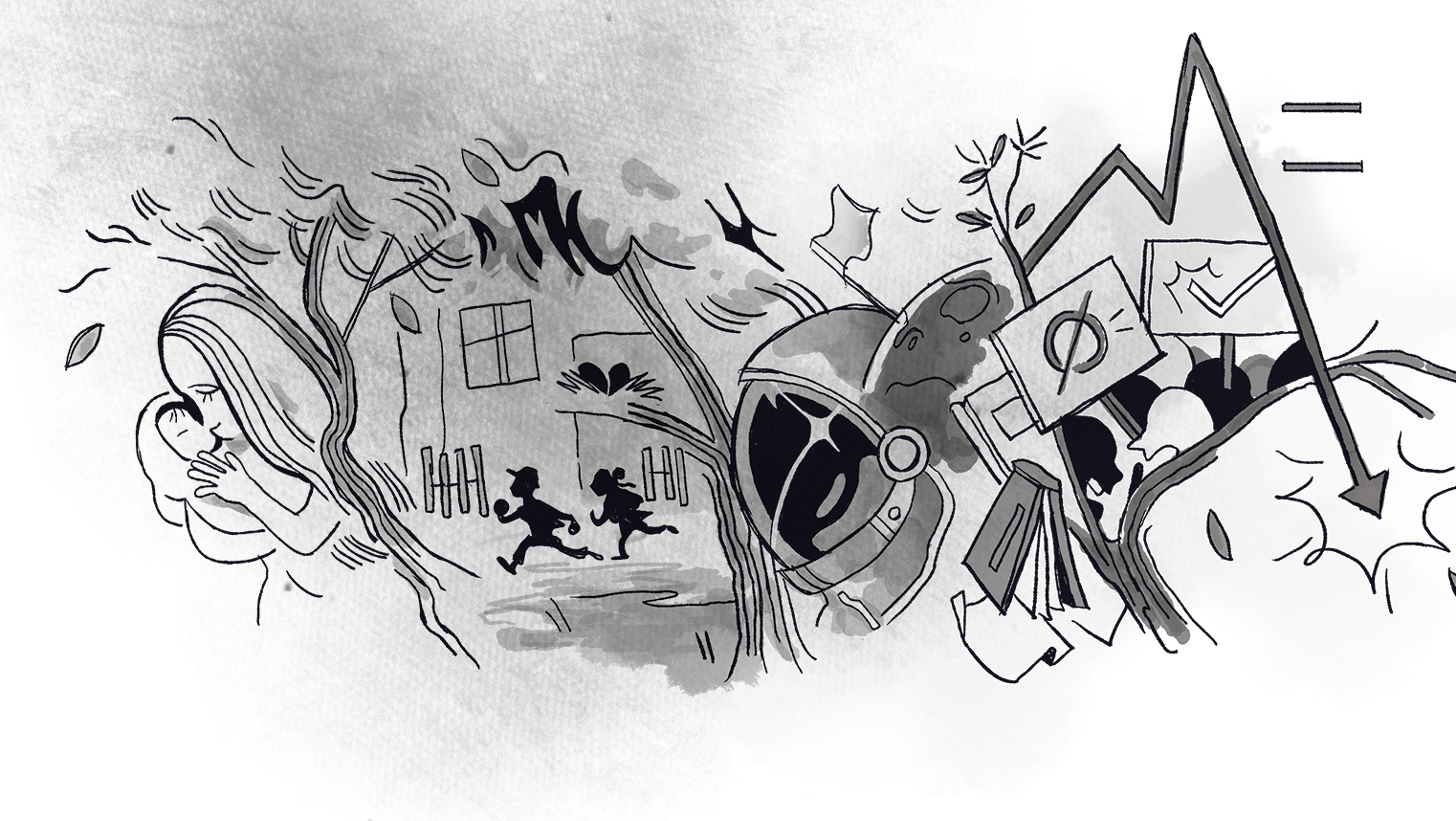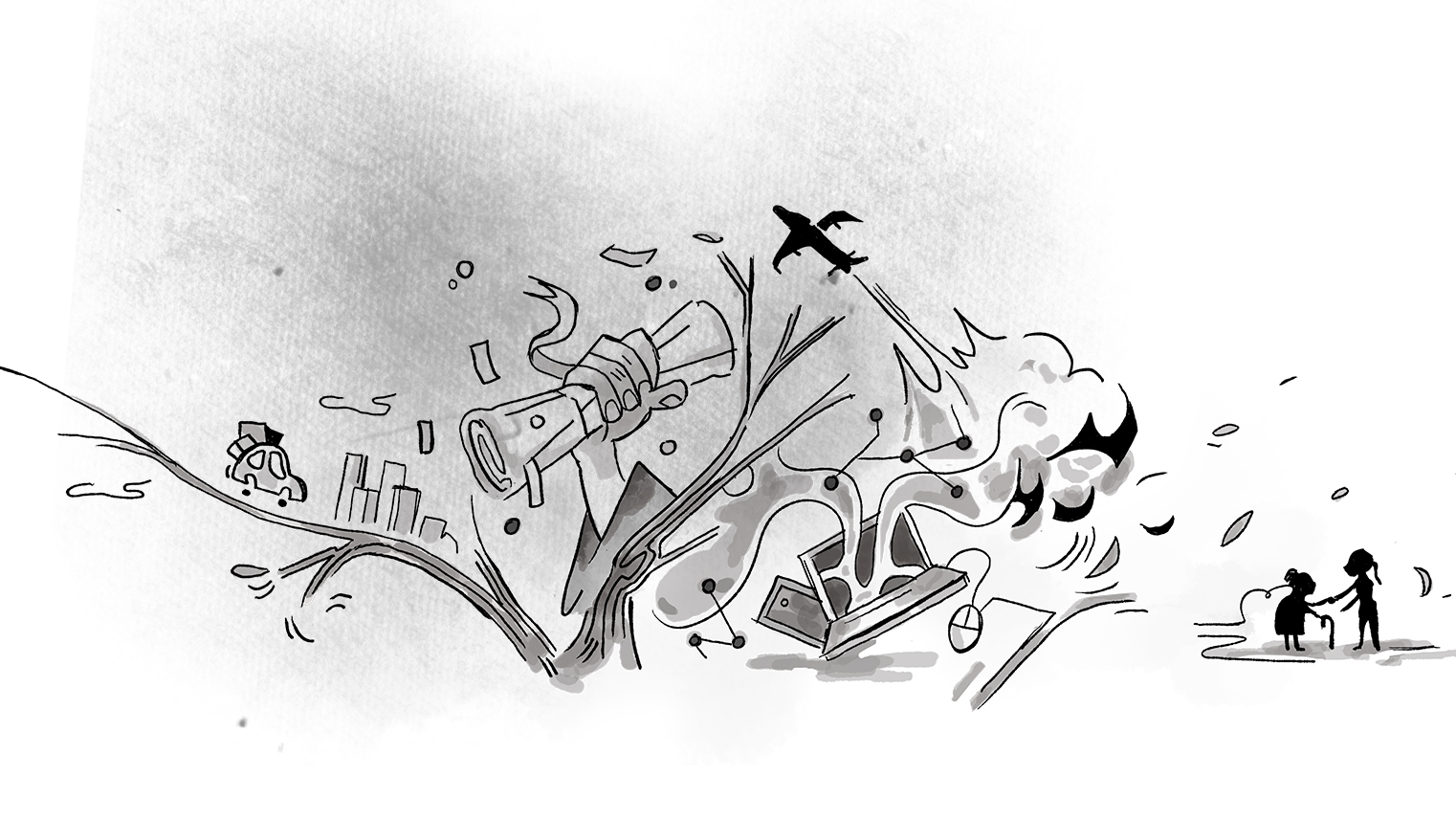Closing the Gap
by Leland Goodrich | published Nov. 3rd, 2020
Generations of human beings have shaped the world as we know it today. From the Greatest Generation to Gen-Z, the actions of each generation have set the tone for the next generation in succession, whether they knew it or not.
Every generation has had major issues that it has had to grapple with, and the way these issues are handled permanently places a generation into the annals of history. Wars, plagues, storms and political movements have all forced the people of a generation to develop in some way.
Over this year, the COVID-19 outbreak has forced the world into a new normal which has tested the resolve of multiple generations as society deals with economic, social and, more importantly, human losses. The recent pandemic has led many in today’s world to wonder how previous generations of humans made it through the defining and challenging times of their own periods.
Sitting down with some of our local community members gave us insight into how issues are handled by each generation. Additionally, it showed us how each generation configures itself with the technology, culture and political environments of their times.
Enlightened by the trying times the pandemic has brought on, knowing how different generations view societal issues through their own experiences and what advice they have for the future is something that everyone can benefit from.
What Defines a Generation?
A generation is often defined by the most historically relevant moments which challenged the society. While these moments can be filled with inspirational and uplifting stories, they too can be a generation’s darkest days.
We’ve seen both inspiration and darkness recently with our own struggles brought on by the mass pandemic. It may seem hard to recall, but this isn’t the first time humanity has had to grapple with the challenges of a pandemic.
As the world dealt with the closing of the First World War, the Influenza Pandemic of 1918 swept the globe. Lasting over two years, the pandemic claimed the lives of millions of people without prejudice.
For many in the generations of today, this may be the first time they have had to deal with the perils of quarantining, isolation and medical protocols the COVID-19 pandemic has brought on.
But perils and hardship are no stranger to the defining points of human history. Today’s generations are well versed in it.
Since overcoming the 1918 pandemic, generations alive today have fought a Second World War, staved off nuclear conflict, expanded civil rights and confronted a plethora of other worldwide challenges.
If history has taught humanity anything, it is that we are resilient. The COVID-19 pandemic indeed may be some of our most challenging times generationally, but it is also a defining moment.
These moments say a lot about what defines a generation, but it says little about what makes each one different. With an influx of experience from a range of different generations, there are things that make up the viewpoints that separate one generation from another.
In Retrospect
Marcia Beattie, the senior academic adviser for the College of Liberal Arts at RIT, recalled a pivotal historical moment that shaped her generation: the Vietnam War.
She recounted being with her fiancé and listening to the television broadcast as a lottery system determined who would get to stay home, in addition to who would be sent off to war in Vietnam.
“He went up for two physicals and he was next on the list, and then they discontinued the lottery for a while, so he never had to go," she said.
The necessity of the war in Vietnam has been greatly debated and the turmoil it caused in the U.S. is undeniable. The impact it had on the generation at the time would be so impactful that its effects can still be seen in modern society.
The effects of the war would be felt for a long time. The policies to come out of the war still affect the functioning of our government today and the experiences the war created for that time period is something that separates generations today.
For Beattie, one important aspect for future generations to consider is the experiences of the preceding generations, as the trials and tribulations of one generation are important for the next generation to learn from.
“That’s why it’s so important that college students are exposed to the liberal arts and not just homed in on engineering or computer science," she said. "They need to know what’s going on in the world."
Yet, the historical challenges that separate one generation from the next are not the only things affecting why generations are different.
“Technology has affected social norms too," Beattie explained.
The technology available to a society is something else that can largely influence how one generation differs from another.
The social media we know and love today has made the new normal caused by the COVID-19 outbreak a viable, yet still undesirable, transition for many. Technology, such as video conferencing or instant delivery services, allows us to still connect and enjoy creature comforts while isolated in our homes. For those that can't stay isolated at home, these technologies have helped front line workers by making therapy, music and other psychological beneficial services more accessible through personal electronics.
That technology is a far cry from the technology available during the 1918 pandemic or the Vietnam War.
Building off her points on technology and experiences, Beattie also pointed out that while it's great that society advances into the future, it’s equally important that we help those who have come before us.
“I think there should be more consideration for senior citizens, more opportunities for housing and things like that," she said.
The historical events faced by society may define a generation, but it is the individuals of a generation that ultimately make overcoming the challenge possible.
Learning from, improving on and caring for the individuals that came before us is something that each succeeding generation should seek to achieve. Past generations offer future generations the ability of hindsight for the challenges they will be facing in their own times.
With that in mind, generational gaps still exist and the hindsight from predecessors can be limited in their use.
A Changing Pace
Nicole Solazzo, a fifth year School Counseling major at the University of Rochester, cited the noticeable generational gap she has with her mom as evidence of a changing pace in society.
She talked about how in her mother’s youth, her mother never had access to a cell phone and leaving the house for four to five hours at a time without being in contact with her parents was normal.
Despite this gap, with the advent of technology nowadays, Solazzo’s mom expects her to check in routinely and not doing so creates worry.
She also noted her experience in customer service. As technology such as modern delivery services gives us access to instantaneous goods, society becomes more demanding of its individuals.
“I think [technology] has caused a lot of people to be in a hurry," she said. "If you’re not fast enough, the customer gets annoyed."
The demands from society today for better and faster everything is growing.
Examples like these technological changes in society can change social norms and create a new expectation from generations to come.
The change in pace between generations is not something new. The telegraph, railroad, automobile and, of course, the internet all made one generation faster than the next.
“Technology is that constant access to media, constantly needing to know everything," Solazzo said.
Where technology will go from where it is today is unknown, but the technology we rely upon will too become a part of what defines our generation.
Closing the Gap
We’ve seen that generations can be different due to their social norms, experiences and technological advances. But generations are not as different from one another as they may seem. The way we handle problems and challenges are what make and define generations. But over the course of history, we have always faced similar problems.
As stated earlier, these challenges may be unique to one generation, but they are not unique to humanity. The flu outbreak of 1918 peaked over 100 years ago, but we still draw lessons learned from that generation’s experience to help today’s generation through events such as the modern quarantine.
However, despite these similarities, there is no doubt that generational gaps exist. The individual who relies on a phone call riffs with the person who relies on an emoji, even if both actions are accomplishing the task of communication.
Much of the societal gaps that exist today are due to one generation not being able to relate to the trying experiences that affected the lives of preceding generations.
Knowing that what makes our generations different are the experiences we go through in our own lifetimes, what are some things we can do as individuals to close the gap between one another in society?
Beattie had some advice for future generations on how they can prepare themselves for the future and for closing the gap with others.
“Be open to new opportunities academically or socially, be willing to take chances and don’t follow someone else’s lead," she said. "Try to make your own path."
“Be open to new opportunities academically or socially, be willing to take chances and don’t follow someone else’s lead. Try to make your own path."
New opportunities can mean more than just a new a job, a new location or a new degree. It can mean learning about someone else’s history and experiences by doing things such as volunteering, advocating and contributing.
By doing things like these, we not only improve ourselves, but we connect with other people outside of our own generation to grow and diversify ourselves for the future.
For Solazzo, her advice for future generations was to take a break from the constantly connected world of the digital age.
She argued that so much of our own time is spent following what’s trending on social media platforms and staying up to speed with celebrities. That time browsing social media takes away from time we could be using to focus on the things that are truly important to ourselves.
“There needs to be less of a focus on what everyone else is doing in their life and more of a focus on what you're doing in yours,” Solazzo said.
"There needs to be less of a focus on what everyone else is doing in their life and more of a focus on what you're doing in yours.”
Maybe the things trending on social media or the lives of socialites are important to you. But the constant and habitual scrolling through newsfeeds can only bring more of the same.
If there are topics or persons that are important to you, individual honing activities such as reading or writing are things you can do to add to your interest all while expanding your knowledge of other generations.
Ultimately though, the best way to have a better connection with those outside of your generation is to have a level of sensitivity to one another.
There are many things today that pull at the threads of our society, but our generational differences don't have to be one of them.
If anything, what makes us different generationally should be experiences that others can learn from and benefit from.
By closing the gap between generations, we can make a more diverse, knowledgeable and capable future that combines the experiences of all individuals.




